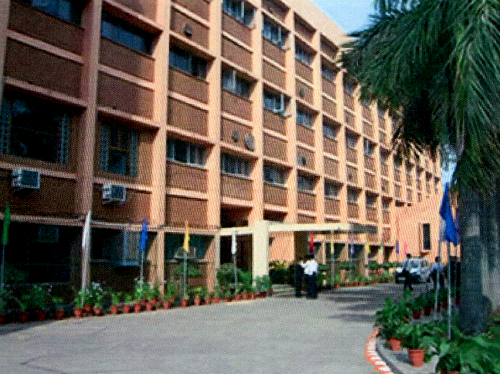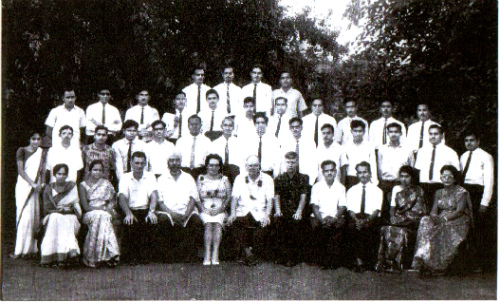| News and Events Page 4-Golden Anniversary at the Pusa Institute New Delhi India
Revisiting the Early Days of the Pusa Institute and the Secondment of Arthur Edwin Simms as ‘First’ Principal between 1964 and 1966
(Extracts from his Biography published by Authorhouse in November 2011) ‘From Punch and Judy to Haute Cuisine-A Biography of the Life and Times of Arthur Edwin Simms 1915 to 2003’ by Michael Flagg
ISBN 9781456782658 (Web Address:-www.arthursimmspioneer.com)
_____________________________________________________________________
Could Charles Belfield Smith and Thangham Philip have envisaged in 1962 the renowned international status which the Pusa Institute would grow to in fifty years with more than 1000 students? In the early 1950’s the government of India by recognising tourism development as a major contribution to the balance of payments also encouraged professionalism in hospitality through education, seeking participation by travel agents and the Travel and Tourism Industry Council. Equipment and expertise being limited resources and hotels were privately owned, although government funding would ensure sufficient rooms for international conference delegates, such as the fully air conditioned Ashoka in New Delhi, opened in 1955. The founding of the Institute of Hotel Management Catering and Applied Nutrition in Mumbai was a first in South East Asia, during the previous year. The Food Craft Institute at Kalmasery and others in eight states would follow later and be upgraded between1982 and 1983.
The overall demand for hospitality education in India would far outweigh the number of teaching centres including the Pusa Institute, which stimulated a quest for advice from overseas. Firstly, John Fuller on cooking appliances, seconded from Battersea Polytechnic (later first Professor in Hospitality Management in the UK at the University of Strathclyde Scotland) and in 1964, Arthur Edwin Simms, seconded from Highbury College Portsmouth as first Principal at the then titled, ‘Indo Pakistan Pusa Institute.’ The Principal Designate V. K. Achutanman from Bombay College would visit Britain and Germany, to establish links for future industrial internships for Pusa students.

The above biography published in November 2011, devotes Chapter 11 to Arthur Simms secondment to the Pusa Institute, at a time when skills in French Cuisine were a priority to meet the expected needs of wealthy European tourists to India.
He was an obvious choice as a founder of the British Army Catering Corps, Head Chef at the Potsdam Conference in 1945, a member of the City and Guilds of London Committee in 1947 for the first examinations in Professional Cookery. Also as first Head of the Department of Hotel and Catering at Brighton, the second centre after Westminster, then in 1952 at Portsmouth Highbury College. His secondment was limited to two years and the principal’s residence was not completed until the end of his first year. Financial constraints meant the Pusa Institute and inauguration by Sri Jagjeivan Ram, Minister of Food and Agriculture, including a cake in the shape of the building, would not take place until the year following Arthur Simms departure.
There was also a further requirement to raise the nutrition standards of the Indian labour force to improve productivity, as exemplified by ‘annapooras’ restaurants in major cities who offered balanced meals instead of a reliance on a diet of cereals. An emphasis that might have contributed to the Mumbai nomenclature as ‘Institute of Hotel Catering and Applied Nutrition’and later at Pusa, as the ‘Institute of Hotel Management Catering and Nutrition’. Ideas which had formulated government initiatives to seek both technical and economic assistance from a United Nations Agency, ‘The Food and Agriculture Organisation’(F.A.O) founded in 1945 in Quebec. As a consequence Charles Belfield-Smith a founder member of the British Hotel and Catering Institute (HCI) was to arrive and remain in India for seventeen years, to act as a facilitator for the development of management and craft educational programmes in catering. As Head of Bombay Catering College he created a two to four year studies programme deployed throughout India and Thangam Philip his counterpart and Principal there achieved international stature in 1975 being honoured by United Nations.
The Bombay syllabus was a fusion of the curriculum of the London City and Guilds, the Ecole Hoteliere and the Cornell School of Hotel Management, with the aim to attract students from Asia, Africa and the Caribbean in a rigorous three year programme of 40 hours per week. Minimum entry requirements were fluent English, elementary mathematics, general science, physics and chemistry. Haute cuisine for which Arthur Simms was renowned formed part of the syllabus. Mr. Brij Kishore Khanna as fourth Principal, remembered his student days and Arthur Simms ‘who had every recipe at his fingertips’, including the proportions of the ingredients and an encyclopaedic knowledge of recipes. He also knew the names of the students and lecturers and always had a smile for everyone. He held exhibitions at the college inviting New Delhi hoteliers to revolutionise their recipes to make them more acceptable to catering industry demands. His strengths were promoting links with industry and raising the development and standards of the Pusa Institute. A man of extensive energy who had an answer to any question, from whom even machinery manufacturers would seek advice. He was very well regarded by his staff and very fondly remembered, everyone being sorry when he left, wishing him to stay longer. He actually made the institute more popular than Bombay in those days! A group photograph (featured in the book) was kindly made available by Mr Brij Kishore Khanna showing all the staff during Arthur’s secondment, his wife Bridie and their youngest son, Patrick. Dr Shyam Patiar one of Arthur’s most gifted students followed him to Highbury and later became a full time lecturer there and Head of Department later Director, at Coleg Llandrill,Rhos-on-Sea, Colwyn Bay, Cymu UK. Although Arthur Simms maintained close links with Pusa he never returned himself but sent out a party of UK hoteliers in 1990.

Picture kindly contributed by Mr. Brij Kishore Khanna fourth Principal at the Pusa Institute
|
